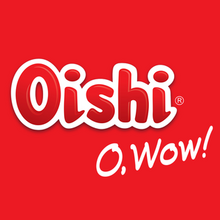 | |
| Company type | Private |
|---|---|
| Industry | Food and beverage industry |
| Founded | 1946 |
| Headquarters | Pasay, Philippines Imus, Cavite |
Area served | Southeast Asia, China, South Asia and South Africa |
Key people | Carlos Chan (Chairman and CEO) |
| Products | Snacks, cereals, biscuits, milk and beverages |
| Website | www |
Liwayway Holdings Company Limited, doing business as Oishi (/oʊˈwɪʃiː/ OH-wih-SHEE), is a snack company based in the Philippines.[1] Its headquarters are in Pasay in Metro Manila.[2] As of 2018, it is headed by Carlos Chan.[3] In China, the company is known as Oishi Shanghaojia (上好佳OISHI).[4]
History
Oishi, started in 1946 as Liwayway,[5] was originally a family-owned corn starch (Tagalog: gawgaw) and coffee repacking business.[1] The name of the business, "Liwayway," meaning "dawn" in English, was selected to reflect the optimism of the Philippines following the aftermath of World War II.[5] By 1966, in addition to distributing starch, the company also began to distribute basic commodities, coffee, and confectioneries. It was incorporated under the name Liwayway Marketing Corporation (LMC) in 1966.[1]
Brothers Carlos and Manuel Chan, at the time, were behind the company.[1] Their brother Ben is the founder of Bench, a Philippine clothing brand.[6] The parents of the Chan brothers are immigrants to the Philippines from Jinjiang county, Quanzhou, Fujian Province, China.[4][7]
The company began distributing Oishi Prawn Crackers and Kirei Yummy Flakes in 1974. The company claims to have been implementing technology from Japan to make the products.[5]
In 2024, Oishi and CEMEX Asia Holdings Ltd. partnered to support sustainable disposal of plastic waste per commitment to environmental stewardship and circular economy principles in industrial operations. “Our partnership with Liwayway allows us to support them with the EPR law (Extended Producer Responsibility Act EPRA of 2022 Republic Act No. 11898), while it also contributes to our Future in Action agenda of becoming a net zero carbon emission company,” said Luis Franco, Cemex CEO. Liwayway will channel plastic packaging waste to Cemex's Solid Cement plant for co-processing.[8]
Expansion
Carlos Chan began prospecting on the expansion of Oishi to China in 1984, following the liberalization of the Chinese economy under Deng Xiaoping starting in 1978.[9] Liwayway went under the name Oishi Shanghaojia, appending "Shanghaojia" (上好佳) to Oishi which literally means "top grade and high quality" in Chinese, and a pun for "尚好甲" (shiang ho jiak, "most tasty") in Hokkien. It entered a joint venture with two state-owned Chinese firms and opened its first overseas manufacturing plant in Pudong, Shanghai[4] The company's China division set up its headquarters in Qingpu District, Shanghai.[10] To improve distribution in China, the company established a factory network there.[3] Oishi also established a presence in Vietnam in 1997 and in Myanmar in 1999. In 2006, factories were opened in Indonesia and Thailand.[9]

Interlink Direct Ltd. imports Oishi products from China to the United Kingdom.[11]
Reception
In 1998, for his contributions to Shanghai, Carlos Chan received a "Magnolia Gold Award," a prize that recognizes expats who contribute to Shanghai's development.[4] In 2005, the City of Shanghai made Carlos Chan an honorary citizen, and Oishi Shanghaojia was declared a "Shanghai famous brand" the following year.[4]
References
- ^ a b c d "Overview." Oishi China. January 3, 2013. Retrieved on April 4, 2014.
- ^ "Privacy Policy Archived 2014-04-07 at the Wayback Machine." Oishi. Retrieved on April 5, 2014. "Liwayway Marketing Corporation 2225 Tolentino St. Brgy. 129, Pasay City"
- ^ a b Flannery, Russell. "He's Not Japanese: China Success Helps Oishi's Carlos Chan Debut On New Philippines List." Forbes. August 11, 2013. Retrieved on April 4, 2014.
- ^ a b c d e Wu, Willa (28 Sep 2018). "Chinese miracle beckons for Filipino 'snacks king'". China Daily. China Daily Information Co (CDIC). Retrieved 14 November 2018.
- ^ a b c "History." Oishi. Retrieved on April 4, 2014.
- ^ Landingin, Roel (2 Dec 2015). "Made It In China: Liwayway's Group Is Now A Leading Brand". Forbes. Forbes Media LLC. Retrieved 14 November 2018.
- ^ Zafra, Jessica. "Carlos Chan: Mr. Oishi." The Philippine Star. March 18, 2012. Retrieved on April 5, 2014.
- ^ "Cemex, Liwayway partner for sustainable plastic waste management". The Manila Times. March 13, 2024. Retrieved March 13, 2024.
- ^ a b Dy, Rolando (26 January 2015). "Building a multinational brand: The Oishi story". Philippine Daily Inquirer. Retrieved 22 September 2016.
- ^ "Company Overview of Liwayway Holdings Company Limited." Businessweek. Retrieved on April 5, 2014. "2277 Hu Qing Ping Highway Shanghai, 201702 China"
- ^ "Oishi 上好佳 Archived 2014-04-07 at the Wayback Machine." Interlink. Retrieved on April 5, 2014.
External links
- Oishi
- Oishi China
- Oishi China (oishi-tm.com) (Archive)
- San Juan, Thelma Sioson. "The Pinoy chips that conquered China." Philippine Daily Inquirer. Sunday March 18, 2012.
